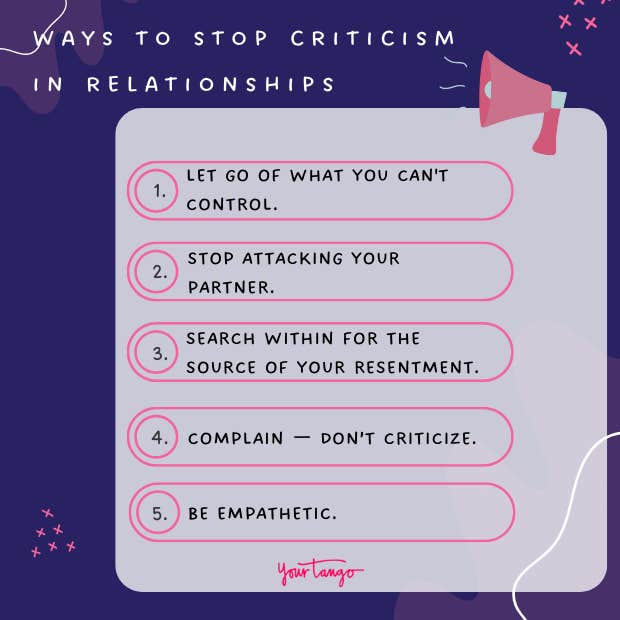How To Know If Criticism Is Damaging Your Relationship (And What To Do If It Is)
Criticism can lead you right to divorce court.
 Sinica Kover / Shutterstock
Sinica Kover / Shutterstock She doesn’t like the way he leaves dishes in the sink and assumes he doesn’t care about her feelings. He doesn’t like how much money she spends on clothes and assumes she doesn’t care about their bills.
Criticism in marriage and relationships is an easy pattern to fall into.
People get frustrated, tired, angry, and even bored with the "same old story" they're writing in their marriages.
Pet peeves and irritations turn into global accusations of "always" and "never," setting up the accused to be defensive. And defensiveness — like criticism, contempt, and stonewalling — is a predictor of a marriage’s demise.
There are many reasons why criticism in marriage is considered one of the greatest predictors of divorce. And if you've reached this stage, you may not see any way out.
But if you can commit to learning how to stop being overly critical toward your partner, you can — even against the odds — save your marriage.
You can even get past merely saving it to recapturing the love that first brought you together. After all, even the happiest relationships have their dark moments.
When does criticism become toxic in a relationship?
Is all criticism bad? Of course not. A major component of the best and strongest relationships is about holding each other accountable at times and communicating constructive feedback in a thoughtful, healthy way.
Some of the most incredible people in our lives — often, romantic partners — challenge us to be the best version of ourselves, which is what we should strive for in our relationships and over the course of our lives.
We also deal with criticism in the workplace. It should be constructive, but almost everyone can tell a story about their experience of never being good enough for that one hypercritical boss.
Sometimes, you might be going through a difficult time when you're just trying to keep your head above water with the scads of paperwork, deadlines, and projects taking over your desk, and the criticism is warranted because something has to give.
The danger with criticism is that it is a slippery slope into contempt.
That boss you "aren't good enough for"? Notice that their opinion of what you deliver seems to have nothing to do with the caliber of your work. Instead, it feels more like a personal attack on your character, as if they have a chip on their shoulder about you.
This happens in relationships, too, where we start nitpicking or being overly critical about a behavior or minor irritation, when it has more to do with resentment and contempt toward one's partner, instead of the actions that are the subject of our attacks against them.
Once your relationship crosses into the territory of contempt, overcoming it is more difficult than recognizing and repairing a pattern of criticism. Both patterns signal a marriage at risk and — along with defensiveness, and stonewalling — altogether known as "The Four Horsemen of the Apocalypse."
How criticism is linked to the rest of Gottman’s Four Horsemen
Marriage and relationship expert John Gottman, Ph.D., is a top researcher who studies couples and the issues that divide them.
Gottman found that there are four distinct behaviors that are the most likely predictors for divorce, which he refers to as the Four Horsemen: defensiveness, stonewalling, contempt, and criticism.
While these are all associated with each other, criticism plays a fundamental role in Gottman's three other key predictors for divorce. (Even stonewalling can be the result of one or both partners being overly critical toward each other and involve an internal dialogue that feeds into one's contempt and resentment toward the other.)
Criticism and contempt are deeply interconnected and, if they go unchecked, they will ultimately work synergistically to destroy your marriage irreversibly.
So, if you're in a contemptuous marriage, you have a choice to make before the contempt makes the choice for you.
Otherwise, this creates the perfect storm to provide a precarious environment that's teeming with resentment and defensiveness.
In response to what feels like an attack on one's character, personality, and overall sense of self, it's easy to react defensively. Being overly critical of someone can cause them to become overwhelmed, as well as feel pain, confusion, and frustration, among other emotions.
When criticism isn't healthy or constructive, and it comes from a place of contempt or resentment, it can be anything from an exaggerated critique of something that is minor in reality to a totally baseless and irrational putdown.
Responding defensively makes a lot of sense in this scenario, though it's nonetheless another damaging force against your relationship or marriage.
What may seem to be on the opposite end of the spectrum is the behavior Gottman refers to as "stonewalling," also known as "the silent treatment." While it is certainly less bombastic than constant arguments with defensive tactics on either or both sides, it's no less dangerous — a silent killer.
5 ways to control criticism in relationships
1. Let go of what you can't control.
We all get frustrated over large and little things we want to change or, in our minds, improve, fix, or do a better job of in the first place.
But none of us has time to be everywhere at all times in every capacity to take care of every little thing. So you need to learn to let go.
You'll also have to learn how to communicate with your spouse better, even when you’re angry.
If the success of a marriage is grounded in respect and equality, then contempt — a combination of disrespect and disgust — is its evil twin. The contemptuous person is steeped in moral superiority and considers their spouse to be unworthy of time, respect, or basic consideration.
Recognizing and reconstructing your communication patterns is important because contempt is an accumulation of stewing emotions.
2. Stop attacking your partner.
You may not understand what’s happening in your marriage. Your contempt may rage inside you that you actually look for ways to make your spouse feel as beneath you as possible.
But if you want your marriage to have a chance of surviving, you have to stop the destructive behavior.
Stop yourself from spewing sarcasm and cruel comments at your spouse. Refuse to put down your spouse, no matter what you feel.
At the very least, while you work on your own role in your marriage, stop your contemptuous behavior.
Disappointment and other negative emotions turn into resentment.
Resentment gets buried deep inside — and then it festers. And eventually — inevitably — it leaks out as sarcasm, name-calling, judgments, mocking, and mean humor.
Overcoming contempt involves much of the same strategy as preventing it in the first place.
And at the heart of the effort is communication, with yourself and with your spouse.

3. Search within for the source of your resentment.
Contempt comes from a build-up of uncommunicated — or miscommunicated — disappointments and dissatisfactions.
Perhaps you've tried to communicate your needs to your spouse in the past and haven’t gotten the response you want or need. Maybe you honestly believe that your spouse doesn’t care about you or love you. Perhaps you feel alone in your marriage.
Whatever it is that's fueling your contempt, you need to define what that is so you can begin to find healthy ways to address it. It may be something specific to you and your past and perhaps have nothing at all to do with your partner at all.
But you need to do the emotional work to find the fuel behind the fire so you can snuff it out and grow, not only as an individual, but striving toward a better relationship — always.
Working with a therapist on this delicate matter can help you gain clarity more quickly and help you separate what parts are really about you from what may be really about your spouse.
4. Complain — don’t criticize.
Complaining probably isn’t something you would think of as a positive tool for overcoming contempt toward your spouse. But if you follow Gottman’s three-part formula for presenting a complaint, you increase your chances of getting your needs met.
Begin by expressing a feeling — not a judgment or criticism: "I feel sad/worried/hurt…"
Then, describe the situation or behavior that leads to that feeling: "... when you don’t respond to my messages during the day.”
Finally, state a positive behavioral change that you need in order for you to feel better: "Would you please make time to respond at least twice during the day so I know you have read my messages?"
What’s important about the complaint process is that you engage in the healthy presentation of your feelings and needs. And you work together toward a resolution that works for both of you.
Moral superiority can’t survive in the context of a relationship, because you own your feelings and make requests for change. Your focus is on the behaviors you want to see changed, not on the other person.
5. Be empathetic.
Empathy is essential to the success of a marriage. It involves respecting the other person so much that you care to understand more deeply what the person is feeling by trying to put yourself in their shoes.
The effort to understand means you have to ask questions, listen with the intention to learn, and validate the feelings expressed.
Empathy and contempt can’t co-exist, because they're polar opposites. So, if you truly want to stop feeling contempt in your marriage, open your heart and keep an open mind, too.
Make emotional, and even spiritual, room for your spouse and all that they need to feel seen, heard, and felt. Be kind to your heart’s guests.
Seek to understand and validate what you've been condemning.
It’s difficult to imagine that two people who once had a united vision for love and life could be tragically driven apart by contempt. But contempt is insidious, and it almost guarantees a grim specter ahead. It's a lose-lose situation if both partners can’t commit to owning their feelings, actions, and the roles they play in creating a comforting environment for keeping the lines of communication open between the two of them.
Further, each should work toward providing the utmost in safe spaces where both partners can be vulnerable and seek solace.
Don't forget that there are resources that can help you along the way, step by step, such as seeking professional help. You may need the intervention and guidance of experts who specialize in at-risk relationships.
If you've allowed your relationship to slide south for this long, you may feel like it's a lost cause to try to turn it around now.
But you can keep hope alive by actively learning how to stop feeling overly critical toward your partner, and showing them how seriously committed you are to creating a relationship that's stronger than ever before. Show how your hypercritical ways have changed and how you've replaced them with new, healthy relationship behaviors.
And if you can reconnect with your memories of happiness and gratitude while continuing to make new ones, you can still get that loving feeling back, along with your relationship back on board.
Dr. Jerry Duberstein, PhD, is a couples therapist and his partner, Mary Ellen Goggin, JD, is a relationship guide. In addition to marriage and couples counseling and coaching, they lead private intensive couples retreats. They are also the co-authors of Relationship Transformation: Have Your Cake and Eat It Too.
